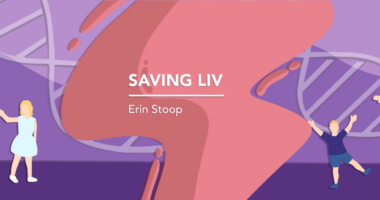How Aphasia Can Affect Those With Sanfilippo Syndrome

Recently, the family of American actor Bruce Willis announced he has been diagnosed with aphasia. The news has raised some discussion about the condition and how it affects people.
Aphasia is a language disorder that is brought on by brain damage, often making a person unable to express themselves as they normally would. It is often a symptom of a larger medical issue, like a stroke or a disease that affects the brain.
My oldest daughter, Abby, has shown signs of aphasia over the past six years or so. It is to be expected since she has Sanfilippo syndrome. I noticed her language begin to decline when she started repeatedly saying the same phrases, which didn’t make any sense. My husband and I eventually took her to neurologists, looking for an explanation.
Little did we know, Abby was missing an enzyme that would break down sugar molecules in her body. This results in the sugar heparan sulfate building up in toxic amounts, wreaking havoc on her brain. As the disease progresses in Abby’s body, it will continue robbing her of abilities like eating and walking.
How will aphasia affect Abby in the long term? The timeline is unknown, but realistically, it is all downhill from here. She will continue to worsen with no hope of improvement. The brain cells that have died because of the toxic buildup of sugars in her body will not revive themselves. Unfortunately, brain cells do not regenerate, so Abby will be forced to function with whatever is left.
I try to imagine what it is like to lose basic skills like talking. What is it like for her and others who suffer from aphasia? Many people with this disorder have drastically different lifestyles after diagnosis. Willis was forced to retire from acting. For children with Sanfilippo syndrome, aphasia further isolates them from the world around them.
When she was younger, Abby spoke in full sentences and could hold basic conversations with others. We were lucky enough to hear her speak from about age 3 to 21, and I am convinced we did not enjoy it enough. Had we known what would happen, we would have recorded more videos and paid even closer attention. But who anticipates a diagnosis like this?
To sympathize with Abby, I always wonder about her awareness. Does she know that she should be able to talk? Her cognitive skills have vastly declined, too, so I don’t think she is aware of it, but I can never be sure. I think it frustrates her not to be able to communicate with us, which is completely understandable.
As Sanfilippo progresses and Abby continues losing her speech, we look for alternate ways for her to tell us how she feels: eye gaze, affect, and gestures. Though it is inconsistent, we are grateful for each and every time she appears to make a choice.
Note: Sanfilippo News is strictly a news and information website about the syndrome. It does not provide medical advice, diagnosis, or treatment. This content is not intended to be a substitute for professional medical advice, diagnosis, or treatment. Always seek the advice of your physician or other qualified health provider with any questions you may have regarding a medical condition. Never disregard professional medical advice or delay in seeking it because of something you have read on this website. The opinions expressed in this column are not those of Sanfilippo News or its parent company, Bionews, and are intended to spark discussion about issues pertaining to Sanfilippo syndrome.








Elena
Thanks! I am a therapist and I meet Chiara every week. Chiara hasn't spoken for some time and I communicate with her through music, gaze, gestures. In short, our dialogues are made of rhythm and movement. Chiara walks and moves for now. Thanks for your shares.
Elena Psychiatric rehabilitation therapist, dance movement therapist, mindfulness trainer.